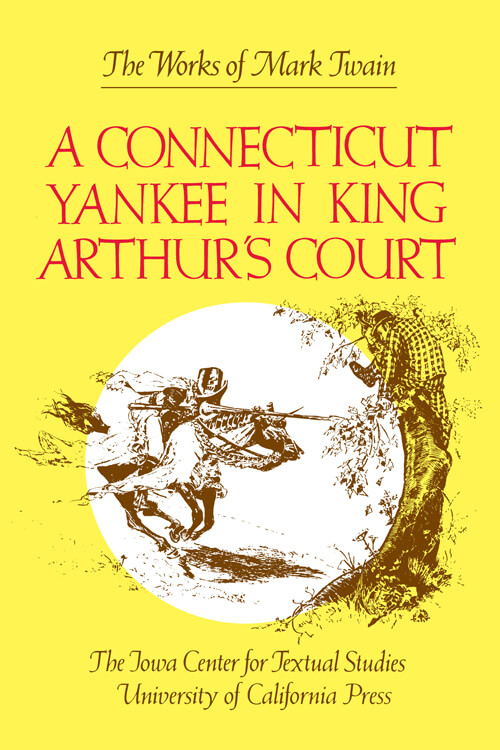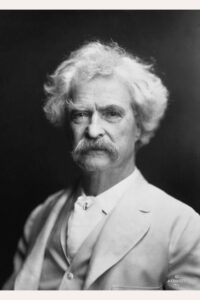
A Connecticut Yankee in King Arthur’s Court
It was in Warwick Castle that I came across the curious stranger whom I am going to talk about. He attracted me by three things: his candid simplicity, his marvelous familiarity with ancient armor, and the restfulness of his company—for he did all the talking. We fell together, as modest people will, in the tail of the herd that was being shown through, and he at once began to say things that interested me. As he talked along, softly, pleasantly, flowingly, he seemed to drift away imperceptibly out of this world and time, and into some remote era and old forgotten country; and so he gradually wove such a spell about me that I seemed to move among the specters and shadows and dust and mold of gray antiquity, holding speech with a relic of it! Exactly as I would speak of my nearest personal friends or enemies, or my most familiar neighbors, he spoke of Sir Bedivere, Sir Bors de Ganis, Sir Launcelot of the Lake, Sir Galahad, and all the other great names of the Table Round—and how old, old, unspeakably old and faded and dry and musty and ancient he came to look as he went on! Presently he turned to me and said, just as one might speak of the weather or any other common matter—
“You know about transmigration of souls; do you know about transposition of epochs—and bodies?”
I said I had not heard of it. He was so little interested—just as when people speak of the weather—that he did not notice whether I made him any answer or not. There was half a moment of silence, immediately interrupted by the droning voice of the salaried cicerone:
“Ancient hauberk, date of the sixth century, time of King Arthur and the Round Table; said to have belonged to the knight Sir Sagramor le Desirous; observe the round hole through the chain-mail in the left breast; can’t be accounted for; supposed to have been done with a bullet since the invention of firearms—perhaps maliciously by Cromwell’s soldiers.”
My acquaintance smiled—not a modern smile, but one that must have gone out of general use many, many centuries ago—and muttered apparently to himself:
“Wit ye well, I saw it done .” Then, after a pause, added: “I did it myself.”
By the time I had recovered from the electric surprise of this remark, he was gone.
Read or download Book
Mark Twain
Samuel Langhorne Clemens (November 30, 1835 – April 21, 1910), known by the pen name Mark Twain, was an American writer, humorist, essayist, entrepreneur, publisher, and lecturer. He was praised as the “greatest humorist the United States has produced”, and William Faulkner called him “the father of American literature”.
Biography.
His novels include The Adventures of Tom Sawyer (1876) and its sequel, Adventures of Huckleberry Finn (1884), with the latter often called the “Great American Novel”. Twain also wrote A Connecticut Yankee in King Arthur’s Court (1889) and Pudd’nhead Wilson (1894), and co-wrote The Gilded Age: A Tale of Today (1873) with Charles Dudley Warner. Twain was raised in Hannibal, Missouri, which later provided the setting for both Tom Sawyer and Huckleberry Finn.
He served an apprenticeship with a printer early in his career, and then worked as a typesetter, contributing articles to his older brother Orion Clemens’ newspaper. Twain then became a riverboat pilot on the Mississippi River, which provided him with the material for Life on the Mississippi (1883). Soon after, Twain headed west to join Orion in Nevada. He referred humorously to his lack of success at mining, turning to journalism for the Virginia City Territorial Enterprise.
He first achieved success as a writer with the humorous story “The Celebrated Jumping Frog of Calaveras County”, which was published in 1865; it was based on a story that he heard at Angels Hotel in Angels Camp, California, where he had spent some time as a miner. The short story brought him international attention. He wrote both fiction and non-fiction. As his fame grew, he became a much sought-after speaker. His wit and satire, both in prose and in speech, earned praise from critics and peers, and Twain was a friend to presidents, artists, industrialists, and European royalty. Although Twain initially spoke out in favor of American interests in the Hawaiian Islands, he later reversed his position, going on to become vice president of the American Anti-Imperialist League from 1901 until he died in 1910, coming out strongly against the Philippine-American War and colonialism.
Twain earned a great deal of money from his writing and lectures but invested in ventures that lost most of it, such as the Paige Compositor, a mechanical typesetter that failed because of its complexity and imprecision. He filed for bankruptcy in the wake of these financial setbacks, but in time overcame his financial troubles with the help of Standard Oil executive Henry Huttleston Rogers. Twain eventually paid all his creditors in full, even though his declaration of bankruptcy meant he was not required to do so. He was born shortly after the appearance of Halley’s Comet and predicted that his death would accompany it as well, dying a day after the comet was at its closest to Earth.






